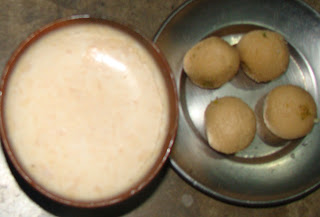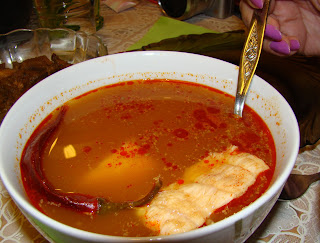We are what we eat!
A good food-culture reflects a lot about a person.
A good dish is not just the result of hard work but it involves imagination, creativity and reflects hospitality. You cannot cook well if you do not love the person you cook for. Motivation plays an important role in cooking.
A good food tradition not only reflects the richness of the agricultural tradition of a land but also how rich the mind of the people also! It reflects through not just what but also how you offer food to others, guests, for example.
In Bengal, when one pays a visit to somebody, she usually brings some sweets as a gift for the host. It is a very old and popular tradition. And sweets and tea are almost always offered to a guest, and quite often something homemade, in addition, so much so that, as I was a child, I thought this exchange of food was the main purpose of visiting neighbours and friends.
Buying or rather selling drinking water is something new to our food-culture.
On the contrary, offering drinking water to travellers, wanderers, saints, anybody tired or even beggars were traditionally an expected good deed in India.
When I was small, sometimes, tired and thirsty in the middle of playing, which was our daily activity in the late afternoon, we asked for water from some neighbour, many times we were given small pieces of sweets in addition. And the lady of the house usually said, "We don't give just water, but we must give some sweets or at least some biscuits with it." I don't know if this mentality is still alive. I have been living in different big cities for the last fifteen years, almost.
Now we can buy bottled water everywhere.
In Kerala, whereever you go, they will offer you drinking water mixed with herbs. (No, you do not have to pay for it in the restaurants.). And I remember, that my friend's Mother packed homemade rose-cookies when I was returning to Bangalore after visiting them in a remote village of Thrissur!
I love the German tradition of saying "Guten Appetit!" to each other at the beginning of a meal or even when somebody comes across somebody else eating or snacking.
When sometimes, in the early evening, I snack in the pantry, whoever comes there to prepare tea or to take water, wishes me "Guten Appetit!"
In contrast, I remember the question some people in India often asked was "Hey, You are eating now! Why? Didn't you have lunch?"
-- "Yes! I had lunch!"
-- "Then?"
-- "Then what? I had lunch five hours ago!"
-- "So?" .... and so, sometimes, unbelievable though, the conversation went on quite long.
Those who eat well, in their house you may find a good garden, too -- even if they do not have a big enough piece of land-- like this, on the roof:

----- This is a mango tree in a small roof garden that belongs to an ordinary middle-class family in a tiny town in West Bengal.

----- Healthy mango flowers on that dwarf tree! :)
And below you can see some other products of the roof garden:


They learnt it from Babylon.





















